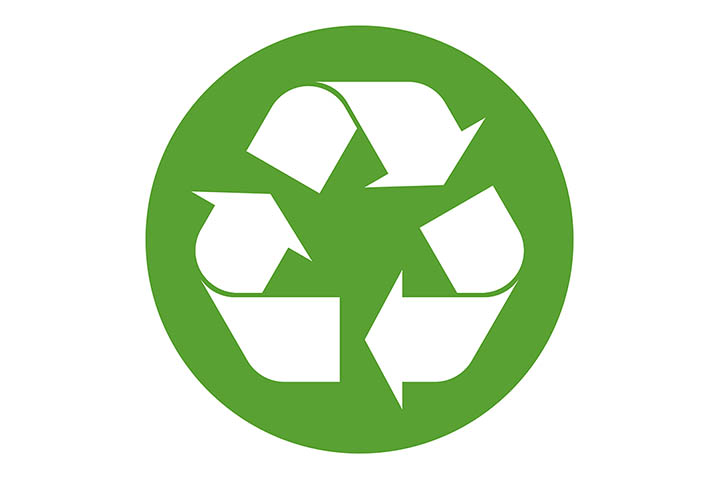Product Hub September 13, 2021
California to Regulate Use of the Recycling Symbol
Products and packaging will have to meet state-mandated criteria in order to bear the “chasing arrows” symbol.
California is poised to become the first state to prevent companies from labeling their products and packaging as “recyclable” unless they meet what would be mandated criteria that proponents say would demonstrate that the items are truly being recycled.
If enacted, Senate Bill 343 would have the potential to impact promotional products suppliers and distributors that label items with the recycling symbol – those three arrows depicted as flowing into each other in a circle, often colored in green.

Companies in promo and beyond would not be able to label their products or packaging as recyclable unless they meet the recycling standards in the bill. Putting the recycling symbol on products or packaging that fails to meet the criteria would constitute a crime, according to the bill.
In effect, products would be considered recyclable if the California Department of Resources Recycling and Recovery (CalRecycle) determines they have a viable end market to be recycled into and meet particular design standards, such as not containing toxic chemicals like PFAs. CalRecycle would collect data on which types of plastics and other materials are most commonly recycled across the state.
One key criteria is that a product or packaging will be considered recyclable if it has what the bill describes as “demonstrated recycling rate of at least 75%, meaning that not less than 75% of the product or packaging sorted and aggregated in the state is reprocessed into new products or packaging.”
Before 2030, products or packaging that’s not collected through curbside collection will be considered recyclable if the non-curbside collection program recovers at least 60% of the product/packaging and “the material has sufficient commercial value to be marketed for recycling and be transported at the end of its useful life to a transfer, processing or recycling facility to be sorted and aggregated…” Come 2030, that standard raises to 75%.
Furthermore, products or packaging will be considered recyclable if they’re of a material type and form that’s collected for recycling programs for jurisdictions that collectively encompass at least 60% of the population of California and are “sorted into defined streams for recycling processes by large volume transfer or processing facilities … that process materials and collectively serve at least 60% of recycling programs statewide, with the defined streams sent to and reclaimed at a reclaiming facility consistent with the requirements of the Basel Convention.”
I’m proud to support SB 343 by Senator @BenAllenCA.
— Assemblymember Tasha Boerner Horvath (@AsmTbh) September 11, 2021
#SB343 would make California the first state in the nation to prohibit companies from using the recycling symbol on any product or packaging unless it is truly recyclable. https://t.co/c7uenkWiAw
Laws already exist to prevent brands from “greenwashing” – the practice of using spurious claims in advertising and marketing about a product’s recyclability, compostability and biodegradability without having evidence to back it up. Still, there’s no strict standard for using the chasing arrow recycling symbol and no criteria for companies to meet in order to use it.
California state Sen. Ben Allen got the idea to change that after learning that plastic sleeves that house his morning newspaper were ending up in landfills. The sleeves are labeled as recyclable and Allen was putting them in his recycling bin. But in reality, they weren’t being recycled – a common fate for single-use plastic products in California, where only 15% of such products are actually recycled.
“It’s a basic truth-in-advertising concept,” Allen, a Democrat and the bill’s lead sponsor, told The New York Times. “We have a lot of people who are dutifully putting materials into the recycling bins that have the recycling symbols on them, thinking that they’re going to be recycled, but actually, they’re heading straight to the landfill.”
Opposition to SB 343 has come from lobbyists and groups representing the plastics and packaging industries.
“SB 343 puts more plastic in landfills, not less,” Matt Seaholm, vice president of government affairs at the Plastics Industry Association, said in a report from Recycling Today. “A number of common plastic products like yogurt cups and microwavable trays would be deemed unrecyclable and, therefore, would be landfilled. Four-and-a-half million tons of polypropylene would now be landfilled as a result of this legislation. All of these products and many more are not only recyclable but are currently recycled in California. We urge the governor to veto this misguided legislation and work with all stakeholders on common-sense solutions to reduce plastic waste, such as increasing investment in recycling infrastructure.”
With the California state legislature having passed SB 343, it now awaits Gov. Gavin Newsom’s signature.

Product Hub
Find the latest in quality products, must-know trends and fresh ideas for upcoming end-buyer campaigns.
